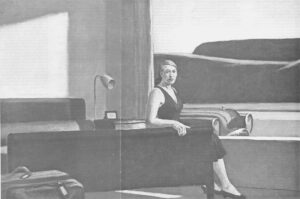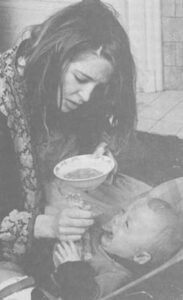Maggie Scarf
- 1978

Fellowship Title:
- Depression Among Women
Fellowship Year:
- 1978

Diana: A Human Mystery
Turning the bend in the corridor, the one just opposite the nurses’ station, I saw Diana seated alone on the small imitation-leather sofa close by the elevators. The light of a winter sun, coming from the windows behind her, spilled over her dark brown hair and gave it a slightly orange tinge. She was waiting for her husband and children, as I knew-the Dahlgrens were coming in this morning for a Family Meeting. Diana’s thoughts, whatever they might have been at this moment, clearly held her preoccupied, engrossed. She, who was usually so hyperaware of others, so elaborately courteous and outgoing- sometimes almost to the point of caricature- didn’t seem aware of my presence until I was standing directly in front of her. For some reason those few instants, the brief span of time during which I walked toward her, have remained fixed in my memory ever since; I’ve wondered why I should have retained this short reel of experience, this irrevelevant happening, so tenaciously. Maybe it had to do with finding Diana so different-so

A Family Romance
As I walked down the corridor, I checked my watch. It was past ten a.m., which left me no more than half an hour to spend with twenty-two year old Bette Glassman. During this time Bette and I would share, for the most part, the sad bath of her silence-though sometimes she did sigh, did offer an occasional comment, which in itself seemed to bubble up from far below the surface, like a communication from a submerged submarine. We had, it’s true, exchanged almost two whole paragraphs on the subject of the research on “women and depression” that I was doing. But this had been over a week ago. The flame of her interest had sputtered rapidly, been doused by a wave of feeling arising from somewhere within. She’d lapsed into her customary apathy, her quiet. Now, the main thing that she managed to communicate to me-and this, unfailingly-was that she expected to see me the following day; and that I must let her know if I wasn’t planning to come. Bette had been on

Femininity as Symptom
Is it possible that those personality traits and characteristics associated with “being feminine” are, in themselves, depressogenic? Isn’t it true that the line between “neurotic” dependency and “normally higher” feminine dependency needs is a difficult one to draw? It may be that being “normal” and being “normally feminine” might not be quite the same thing. I want to talk now about the witty (if somewhat devastating in their implications) researches carried out by Inge and Donald Broverman and their colleagues. This work was reported upon in the Journal of Consulting and Clinical Psychology in 1970. What the Broverman group did was to devise a deceptively simple list, a brief questionnaire, in which a number of traits considered highly feminine were placed on a scale of I to 10 with their “masculine” opposites at the other pole. The Broverman list looked like this: And so forth…there were 38 such masculine” – ” feminine” personality traits placed in contraposition to one another on the Broverman questionnaire. The researchers then sent this sheet around to three different groups

Birth and the Blues
Laurie Michaelson had heard, vaguely, about a condition called postpartum depression: she wondered, a few times, if this could relate to this strange, numb, unhappy sense of herself that she was presently experiencing. But postpartum depression was, she believed, something that occurred just after the birth of a baby-and Laurie’s daughter, Katherine, was now over eight months old. It was true, nevertheless, that she’d just ceased breast-feeding the baby, and that she was feeling internal sensations that indicated that her period was coming on. There must be, certainly, massive hormonal changes involved when a woman discontinues nursing. It was the only explanation she could really give herself, for she never felt so wretched as this in her entire life. As the Christmas and New Year’s holidays grew closer, she found herself unhappy to a degree that was truly frightening. There was no rational explanation that might make comprehensible to her this sense of inner devastation. And yet it went on, and grew worse: she had begun accusing herself of every kind of weakness and failing.

Depression: A Female Malady?
“It’s a fact that in almost every clinical situation and almost every organized health care system, women are diagnosed as depressed three times as frequently as are men. This is a fact not only in this country, but in virtually every health care system around the world — in industrial and urban and even in non-industrial and rural settings — there are going to be three cases of female depression for every male who comes in for treatment of depressive symptoms…” (From a Harvard Medical School lecture delivered by Dr. Gerald L. Klerman, an expert in the field of Depression and currently Director of ADAMHA (Alcohol, Drug Abuse and Mental Health Administration.) “Depression is, you know, a bit like a trick mirror,” one physician told me. “I mean that it blows up, enlarges — displays in fantastic disproportion — those psychological issues and problems that are normal, that are expectable, that are simply endemic to the various ages and stages of the life-arc.” An adolescent girl, a woman in her late twenties, or at mid-life,
